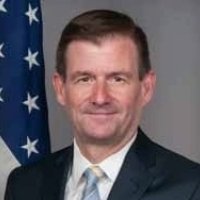The Hamas-Israel War: Analysis from Wilson Experts and Alums
Submit a question
Hamas' unprecedented assault on Israel and the ongoing Hamas-Israel conflict represents an inflection point in the Middle East and North Africa region. The stakes are high for further escalation and a wider conflict in the MENA region, which remains key for U.S. national security. MEP hosted a virtual panel discussion featuring former Wilson Center Fellows and scholars who provided valuable commentary and in-depth analysis on the latest developments in Israel and the Palestinian Territories.
Restoring Security and Deterrence
Ambassador David Hale, former U.S. Ambassador to Lebanon, expressed sympathy for the Israeli people and discussed the situation in Lebanon, where protests outside the U.S. Embassy were taking place, accompanied by rocket exchanges between Hezbollah and Israel on the southern border of Lebanon. The role of Hezbollah as a proxy of Iran was highlighted, and it was noted that the leadership of Hezbollah was more motivated by Iranian goals than Palestinian issues and that Hezbollah has "barely ever lifted a finger on behalf of the Palestinian people." Although Ambassador Hale recognized that it is very likely that another conflict front in northern Israel could open between the IDF and Hezbollah, he posited, "I don't think Hezbollah wants to provoke a second Israeli front, nor would Israel in any sense want to have that as well." Ambassador Hale strongly underscored what should be the number one priority for the United States and Israel at this moment: restoring deterrence and strength to the region to prevent any highly potential spillover conflicts.
Israeli Political Instability and Leadership
Hebrew University of Jerusalem's Guy Laron shed light on the current mood in Israel, characterized by unprecedented security threats and severe internal political conflict. He highlighted how the terrorist attacks on October 7th by Hamas had undermined the "Bibi Doctrine," which advocated weakening the Palestinian Authority in the West Bank and allowing Hamas to govern Gaza, and ignore the Israeli-Palestinian conflict, ultimately aiming to achieve peace agreements with other countries in the region, as was done in 2020 via the historical Abraham Accords. Laron raised concerns about Prime Minister Netanyahu's delay in meeting with families of Israeli hostages taken by Hamas and his unwillingness to exchange hostages and bring about a ceasefire. He also emphasized that PM Netanyahu's political survival would hinge on a ground invasion of Gaza, which enjoys overwhelming support among Israelis. Furthermore, Laron raised the international economic aspect of this conflict and remarked that "Anything that would happen right now in the Persian Gulf would have huge implications for the cohesion of NATO support to Ukraine" and most of Europe, as they have suspended energy transactions with Russia since they invaded Ukraine last year.
Humanitarian Concerns and Global Implications
Dalia Dassa Kaye provided insights into the dire humanitarian conditions in Gaza, where over 4,000 people had been killed and 11,000 wounded in one of the world's most densely populated areas. She expressed skepticism about the prospects of diplomatic negotiations regarding humanitarian aid. The context of the conflict was examined, emphasizing the 16-year blockade of Gaza, its significant youth population, and over 80% of the people living in poverty. She highlighted that the narrative is shifting from Israel as an unprepared victim to the suffering in Gaza and expressed concern regarding an imminent Israeli ground invasion in Gaza. Dassa Kaye remarked, "As bad as Gaza is right now, things could get much worse" if there is an escalation between American and Iranian forces, and also emphasized Hezbollah's far greater military capability and arsenal of advanced missiles that can reach any point in Israel. Therefore, the highest priority has to be containing the escalation. She also discussed China's role in the changing landscape of the Middle East and argued that both China and the U.S. don't want to see a disruption in energy exports coming out of the region as a result of the Israel-Hamas War.
In summary, the event provided a comprehensive analysis of the ongoing Hamas-Israel conflict, covering its profound human impact, the challenges of addressing humanitarian concerns, and the role of various stakeholders. The event also explored the implications of the Abraham Accords and the potential for global instability resulting from the conflict.
Speakers

Former Under Secretary of State for Political Affairs; Former Ambassador to Pakistan, Lebanon, and Jordan

Senior Lecturer, The Hebrew University of Jerusalem, Israel

Moderator

Hosted By

Middle East Program
The Wilson Center’s Middle East Program serves as a crucial resource for the policymaking community and beyond, providing analyses and research that helps inform US foreign policymaking, stimulates public debate, and expands knowledge about issues in the wider Middle East and North Africa (MENA) region. Read more
